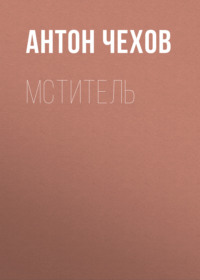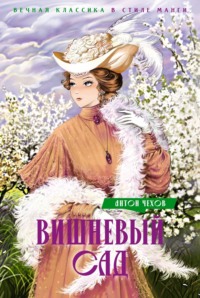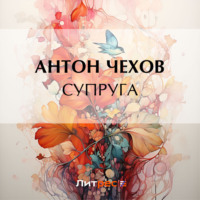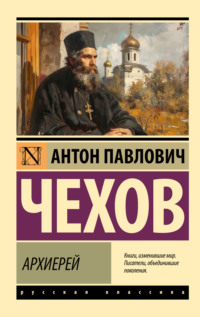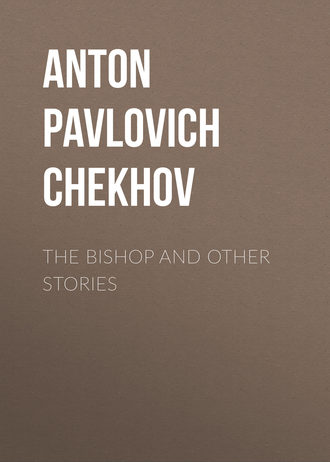 полная версия
полная версияThe Bishop and Other Stories
"Where are you going, dearie?" asked the Jewess.
"To school," answered Yegorushka.
"And how many brothers and sisters have you got?"
"I am the only one; there are no others."
"O-oh!" sighed the Jewess, and turned her eyes upward. "Poor mamma, poor mamma! How she will weep and miss you! We are going to send our Nahum to school in a year. O-oh!"
"Ah, Nahum, Nahum!" sighed Moisey Moisevitch, and the skin of his pale face twitched nervously. "And he is so delicate."
The greasy quilt quivered, and from beneath it appeared a child's curly head on a very thin neck; two black eyes gleamed and stared with curiosity at Yegorushka. Still sighing, Moisey Moisevitch and the Jewess went to the chest of drawers and began talking in Yiddish. Moisey Moisevitch spoke in a low bass undertone, and altogether his talk in Yiddish was like a continual "ghaal-ghaal-ghaal-ghaal,." while his wife answered him in a shrill voice like a turkeycock's, and the whole effect of her talk was something like "Too-too-too-too!" While they were consulting, another little curly head on a thin neck peeped out of the greasy quilt, then a third, then a fourth… If Yegorushka had had a fertile imagination he might have imagined that the hundred-headed hydra was hiding under the quilt.
"Ghaal-ghaal-ghaal-ghaal!" said Moisey Moisevitch.
"Too-too-too-too!" answered the Jewess.
The consultation ended in the Jewess's diving with a deep sigh into the chest of drawers, and, unwrapping some sort of green rag there, she took out a big rye cake made in the shape of a heart.
"Take it, dearie," she said, giving Yegorushka the cake; "you have no mamma now – no one to give you nice things."
Yegorushka stuck the cake in his pocket and staggered to the door, as he could not go on breathing the foul, sour air in which the innkeeper and his wife lived. Going back to the big room, he settled himself more comfortably on the sofa and gave up trying to check his straying thoughts.
As soon as Kuzmitchov had finished counting out the notes he put them back into the bag. He did not treat them very respectfully and stuffed them into the dirty sack without ceremony, as indifferently as though they had not been money but waste paper.
Father Christopher was talking to Solomon.
"Well, Solomon the Wise!" he said, yawning and making the sign of the cross over his mouth. "How is business?"
"What sort of business are you talking about?" asked Solomon, and he looked as fiendish, as though it were a hint of some crime on his part.
"Oh, things in general. What are you doing?"
"What am I doing?" Solomon repeated, and he shrugged his shoulders. "The same as everyone else… You see, I am a menial, I am my brother's servant; my brother's the servant of the visitors; the visitors are Varlamov's servants; and if I had ten millions, Varlamov would be my servant."
"Why would he be your servant?"
"Why, because there isn't a gentleman or millionaire who isn't ready to lick the hand of a scabby Jew for the sake of making a kopeck. Now, I am a scabby Jew and a beggar. Everybody looks at me as though I were a dog, but if I had money Varlamov would play the fool before me just as Moisey does before you."
Father Christopher and Kuzmitchov looked at each other. Neither of them understood Solomon. Kuzmitchov looked at him sternly and dryly, and asked:
"How can you compare yourself with Varlamov, you blockhead?"
"I am not such a fool as to put myself on a level with Varlamov," answered Solomon, looking sarcastically at the speaker. "Though Varlamov is a Russian, he is at heart a scabby Jew; money and gain are all he lives for, but I threw my money in the stove! I don't want money, or land, or sheep, and there is no need for people to be afraid of me and to take off their hats when I pass. So I am wiser than your Varlamov and more like a man!"
A little later Yegorushka, half asleep, heard Solomon in a hoarse hollow voice choked with hatred, in hurried stuttering phrases, talking about the Jews. At first he talked correctly in Russian, then he fell into the tone of a Jewish recitation, and began speaking as he had done at the fair with an exaggerated Jewish accent.
"Stop!." Father Christopher said to him. "If you don't like your religion you had better change it, but to laugh at it is a sin; it is only the lowest of the low who will make fun of his religion."
"You don't understand," Solomon cut him short rudely. "I am talking of one thing and you are talking of something else.."
"One can see you are a foolish fellow," sighed Father Christopher.
"I admonish you to the best of my ability, and you are angry. I
speak to you like an old man quietly, and you answer like a turkeycock:
'Bla – bla – bla!' You really are a queer fellow.."
Moisey Moisevitch came in. He looked anxiously at Solomon and at his visitors, and again the skin on his face quivered nervously. Yegorushka shook his head and looked about him; he caught a passing glimpse of Solomon's face at the very moment when it was turned three-quarters towards him and when the shadow of his long nose divided his left cheek in half; the contemptuous smile mingled with that shadow; the gleaming sarcastic eyes, the haughty expression, and the whole plucked-looking little figure, dancing and doubling itself before Yegorushka's eyes, made him now not like a buffoon, but like something one sometimes dreams of, like an evil spirit.
"What a ferocious fellow you've got here, Moisey Moisevitch! God bless him!" said Father Christopher with a smile. "You ought to find him a place or a wife or something… There's no knowing what to make of him.."
Kuzmitchov frowned angrily. Moisey Moisevitch looked uneasily and inquiringly at his brother and the visitors again.
"Solomon, go away!" he said shortly. "Go away!" and he added something in Yiddish. Solomon gave an abrupt laugh and went out.
"What was it?" Moisey Moisevitch asked Father Christopher anxiously.
"He forgets himself," answered Kuzmitchov. "He's rude and thinks too much of himself."
"I knew it!" Moisey Moisevitch cried in horror, clasping his hands. "Oh dear, oh dear!" he muttered in a low voice. "Be so kind as to excuse it, and don't be angry. He is such a queer fellow, such a queer fellow! Oh dear, oh dear! He is my own brother, but I have never had anything but trouble from him. You know he's.."
Moisey Moisevitch crooked his finger by his forehead and went on:
"He is not in his right mind;.. he's hopeless. And I don't know what I am to do with him! He cares for nobody, he respects nobody, and is afraid of nobody… You know he laughs at everybody, he says silly things, speaks familiarly to anyone. You wouldn't believe it, Varlamov came here one day and Solomon said such things to him that he gave us both a taste of his whip… But why whip me? Was it my fault? God has robbed him of his wits, so it is God's will, and how am I to blame?"
Ten minutes passed and Moisey Moisevitch was still muttering in an undertone and sighing:
"He does not sleep at night, and is always thinking and thinking and thinking, and what he is thinking about God only knows. If you go to him at night he is angry and laughs. He doesn't like me either.. And there is nothing he wants! When our father died he left us each six thousand roubles. I bought myself an inn, married, and now I have children; and he burnt all his money in the stove. Such a pity, such a pity! Why burn it? If he didn't want it he could give it to me, but why burn it?"
Suddenly the swing-door creaked and the floor shook under footsteps. Yegorushka felt a draught of cold air, and it seemed to him as though some big black bird had passed by him and had fluttered its wings close in his face. He opened his eyes… His uncle was standing by the sofa with his sack in his hands ready for departure; Father Christopher, holding his broad-brimmed top-hat, was bowing to someone and smiling – not his usual soft kindly smile, but a respectful forced smile which did not suit his face at all – while Moisey Moisevitch looked as though his body had been broken into three parts, and he were balancing and doing his utmost not to drop to pieces. Only Solomon stood in the corner with his arms folded, as though nothing had happened, and smiled contemptuously as before.
"Your Excellency must excuse us for not being tidy," moaned Moisey Moisevitch with the agonizingly sweet smile, taking no more notice of Kuzmitchov or Father Christopher, but swaying his whole person so as to avoid dropping to pieces. "We are plain folks, your Excellency."
Yegorushka rubbed his eyes. In the middle of the room there really was standing an Excellency, in the form of a young plump and very beautiful woman in a black dress and a straw hat. Before Yegorushka had time to examine her features the image of the solitary graceful poplar he had seen that day on the hill for some reason came into his mind.
"Has Varlamov been here to-day?" a woman's voice inquired.
"No, your Excellency," said Moisey Moisevitch.
"If you see him to-morrow, ask him to come and see me for a minute."
All at once, quite unexpectedly, Yegorushka saw half an inch from his eyes velvety black eyebrows, big brown eyes, delicate feminine cheeks with dimples, from which smiles seemed radiating all over the face like sunbeams. There was a glorious scent.
"What a pretty boy!" said the lady. "Whose boy is it? Kazimir Mihalovitch, look what a charming fellow! Good heavens, he is asleep!"
And the lady kissed Yegorushka warmly on both cheeks, and he smiled and, thinking he was asleep, shut his eyes. The swing-door squeaked, and there was the sound of hurried footsteps, coming in and going out.
"Yegorushka, Yegorushka!" he heard two bass voices whisper. "Get up; it is time to start."
Somebody, it seemed to be Deniska, set him on his feet and led him by the arm. On the way he half-opened his eyes and once more saw the beautiful lady in the black dress who had kissed him. She was standing in the middle of the room and watched him go out, smiling at him and nodding her head in a friendly way. As he got near the door he saw a handsome, stoutly built, dark man in a bowler hat and in leather gaiters. This must have been the lady's escort.
"Woa!" he heard from the yard.
At the front door Yegorushka saw a splendid new carriage and a pair of black horses. On the box sat a groom in livery, with a long whip in his hands. No one but Solomon came to see the travellers off. His face was tense with a desire to laugh; he looked as though he were waiting impatiently for the visitors to be gone, so that he might laugh at them without restraint.
"The Countess Dranitsky," whispered Father Christopher, clambering into the chaise.
"Yes, Countess Dranitsky," repeated Kuzmitchov, also in a whisper.
The impression made by the arrival of the countess was probably very great, for even Deniska spoke in a whisper, and only ventured to lash his bays and shout when the chaise had driven a quarter of a mile away and nothing could be seen of the inn but a dim light.
IV
Who was this elusive, mysterious Varlamov of whom people talked so much, whom Solomon despised, and whom even the beautiful countess needed? Sitting on the box beside Deniska, Yegorushka, half asleep, thought about this person. He had never seen him. But he had often heard of him and pictured him in his imagination. He knew that Varlamov possessed several tens of thousands of acres of land, about a hundred thousand sheep, and a great deal of money. Of his manner of life and occupation Yegorushka knew nothing, except that he was always "going his rounds in these parts," and he was always being looked for.
At home Yegorushka had heard a great deal of the Countess Dranitsky, too. She, too, had some tens of thousands of acres, a great many sheep, a stud farm and a great deal of money, but she did not "go rounds," but lived at home in a splendid house and grounds, about which Ivan Ivanitch, who had been more than once at the countess's on business, and other acquaintances told many marvellous tales; thus, for instance, they said that in the countess's drawing-room, where the portraits of all the kings of Poland hung on the walls, there was a big table-clock in the form of a rock, on the rock a gold horse with diamond eyes, rearing, and on the horse the figure of a rider also of gold, who brandished his sword to right and to left whenever the clock struck. They said, too, that twice a year the countess used to give a ball, to which the gentry and officials of the whole province were invited, and to which even Varlamov used to come; all the visitors drank tea from silver samovars, ate all sorts of extraordinary things (they had strawberries and raspberries, for instance, in winter at Christmas), and danced to a band which played day and night..
"And how beautiful she is," thought Yegorushka, remembering her face and smile.
Kuzmitchov, too, was probably thinking about the countess. For when the chaise had driven a mile and a half he said:
"But doesn't that Kazimir Mihalovitch plunder her right and left! The year before last when, do you remember, I bought some wool from her, he made over three thousand from my purchase alone."
"That is just what you would expect from a Pole," said Father
Christopher.
"And little does it trouble her. Young and foolish, as they say, her head is full of nonsense."
Yegorushka, for some reason, longed to think of nothing but Varlamov and the countess, particularly the latter. His drowsy brain utterly refused ordinary thoughts, was in a cloud and retained only fantastic fairy-tale images, which have the advantage of springing into the brain of themselves without any effort on the part of the thinker, and completely vanishing of themselves at a mere shake of the head; and, indeed, nothing that was around him disposed to ordinary thoughts. On the right there were the dark hills which seemed to be screening something unseen and terrible; on the left the whole sky about the horizon was covered with a crimson glow, and it was hard to tell whether there was a fire somewhere, or whether it was the moon about to rise. As by day the distance could be seen, but its tender lilac tint had gone, quenched by the evening darkness, in which the whole steppe was hidden like Moisey Moisevitch's children under the quilt.
Corncrakes and quails do not call in the July nights, the nightingale does not sing in the woodland marsh, and there is no scent of flowers, but still the steppe is lovely and full of life. As soon as the sun goes down and the darkness enfolds the earth, the day's weariness is forgotten, everything is forgiven, and the steppe breathes a light sigh from its broad bosom. As though because the grass cannot see in the dark that it has grown old, a gay youthful twitter rises up from it, such as is not heard by day; chirruping, twittering, whistling, scratching, the basses, tenors and sopranos of the steppe all mingle in an incessant, monotonous roar of sound in which it is sweet to brood on memories and sorrows. The monotonous twitter soothes to sleep like a lullaby; you drive and feel you are falling asleep, but suddenly there comes the abrupt agitated cry of a wakeful bird, or a vague sound like a voice crying out in wonder "A-ah, a-ah!" and slumber closes one's eyelids again. Or you drive by a little creek where there are bushes and hear the bird, called by the steppe dwellers "the sleeper," call "Asleep, asleep, asleep!" while another laughs or breaks into trills of hysterical weeping – that is the owl. For whom do they call and who hears them on that plain, God only knows, but there is deep sadness and lamentation in their cry… There is a scent of hay and dry grass and belated flowers, but the scent is heavy, sweetly mawkish and soft.
Everything can be seen through the mist, but it is hard to make out the colours and the outlines of objects. Everything looks different from what it is. You drive on and suddenly see standing before you right in the roadway a dark figure like a monk; it stands motionless, waiting, holding something in its hands… Can it be a robber? The figure comes closer, grows bigger; now it is on a level with the chaise, and you see it is not a man, but a solitary bush or a great stone. Such motionless expectant figures stand on the low hills, hide behind the old barrows, peep out from the high grass, and they all look like human beings and arouse suspicion.
And when the moon rises the night becomes pale and dim. The mist seems to have passed away. The air is transparent, fresh and warm; one can see well in all directions and even distinguish the separate stalks of grass by the wayside. Stones and bits of pots can be seen at a long distance. The suspicious figures like monks look blacker against the light background of the night, and seem more sinister. More and more often in the midst of the monotonous chirruping there comes the sound of the "A-ah, a-ah!" of astonishment troubling the motionless air, and the cry of a sleepless or delirious bird. Broad shadows move across the plain like clouds across the sky, and in the inconceivable distance, if you look long and intently at it, misty monstrous shapes rise up and huddle one against another… It is rather uncanny. One glances at the pale green, star-spangled sky on which there is no cloudlet, no spot, and understands why the warm air is motionless, why nature is on her guard, afraid to stir: she is afraid and reluctant to lose one instant of life. Of the unfathomable depth and infinity of the sky one can only form a conception at sea and on the steppe by night when the moon is shining. It is terribly lonely and caressing; it looks down languid and alluring, and its caressing sweetness makes one giddy.
You drive on for one hour, for a second… You meet upon the way a silent old barrow or a stone figure put up God knows when and by whom; a nightbird floats noiselessly over the earth, and little by little those legends of the steppes, the tales of men you have met, the stories of some old nurse from the steppe, and all the things you have managed to see and treasure in your soul, come back to your mind. And then in the churring of insects, in the sinister figures, in the ancient barrows, in the blue sky, in the moonlight, in the flight of the nightbird, in everything you see and hear, triumphant beauty, youth, the fulness of power, and the passionate thirst for life begin to be apparent; the soul responds to the call of her lovely austere fatherland, and longs to fly over the steppes with the nightbird. And in the triumph of beauty, in the exuberance of happiness you are conscious of yearning and grief, as though the steppe knew she was solitary, knew that her wealth and her inspiration were wasted for the world, not glorified in song, not wanted by anyone; and through the joyful clamour one hears her mournful, hopeless call for singers, singers!
"Woa! Good-evening, Panteley! Is everything all right?"
"First-rate, Ivan Ivanitch!
"Haven't you seen Varlamov, lads?"
"No, we haven't."
Yegorushka woke up and opened his eyes. The chaise had stopped. On the right the train of waggons stretched for a long way ahead on the road, and men were moving to and fro near them. All the waggons being loaded up with great bales of wool looked very high and fat, while the horses looked short-legged and little.
"Well, then, we shall go on to the Molokans'!" Kuzmitchov said aloud. "The Jew told us that Varlamov was putting up for the night at the Molokans'. So good-bye, lads! Good luck to you!"
"Good-bye, Ivan Ivanitch," several voices replied.
"I say, lads," Kuzmitchov cried briskly, "you take my little lad along with you! Why should he go jolting off with us for nothing? You put him on the bales, Panteley, and let him come on slowly, and we shall overtake you. Get down, Yegor! Go on; it's all right.."
Yegorushka got down from the box-seat. Several hands caught him, lifted him high into the air, and he found himself on something big, soft, and rather wet with dew. It seemed to him now as though the sky were quite close and the earth far away.
"Hey, take his little coat!" Deniska shouted from somewhere far below.
His coat and bundle flung up from far below fell close to Yegorushka. Anxious not to think of anything, he quickly put his bundle under his head and covered himself with his coat, and stretching his legs out and shrinking a little from the dew, he laughed with content.
"Sleep, sleep, sleep,." he thought.
"Don't be unkind to him, you devils!" he heard Deniska's voice below.
"Good-bye, lads; good luck to you," shouted Kuzmitchov. "I rely upon you!"
"Don't you be uneasy, Ivan Ivanitch!"
Deniska shouted to the horses, the chaise creaked and started, not along the road, but somewhere off to the side. For two minutes there was silence, as though the waggons were asleep and there was no sound except the clanking of the pails tied on at the back of the chaise as it slowly died away in the distance. Then someone at the head of the waggons shouted:
"Kiruha! Sta-art!"
The foremost of the waggons creaked, then the second, then the third… Yegorushka felt the waggon he was on sway and creak also. The waggons were moving. Yegorushka took a tighter hold of the cord with which the bales were tied on, laughed again with content, shifted the cake in his pocket, and fell asleep just as he did in his bed at home..
When he woke up the sun had risen, it was screened by an ancient barrow, and, trying to shed its light upon the earth, it scattered its beams in all directions and flooded the horizon with gold. It seemed to Yegorushka that it was not in its proper place, as the day before it had risen behind his back, and now it was much more to his left… And the whole landscape was different. There were no hills now, but on all sides, wherever one looked, there stretched the brown cheerless plain; here and there upon it small barrows rose up and rooks flew as they had done the day before. The belfries and huts of some village showed white in the distance ahead; as it was Sunday the Little Russians were at home baking and cooking – that could be seen by the smoke which rose from every chimney and hung, a dark blue transparent veil, over the village. In between the huts and beyond the church there were blue glimpses of a river, and beyond the river a misty distance. But nothing was so different from yesterday as the road. Something extraordinarily broad, spread out and titanic, stretched over the steppe by way of a road. It was a grey streak well trodden down and covered with dust, like all roads. Its width puzzled Yegorushka and brought thoughts of fairy tales to his mind. Who travelled along that road? Who needed so much space? It was strange and unintelligible. It might have been supposed that giants with immense strides, such as Ilya Muromets and Solovy the Brigand, were still surviving in Russia, and that their gigantic steeds were still alive. Yegorushka, looking at the road, imagined some half a dozen high chariots racing along side by side, like some he used to see in pictures in his Scripture history; these chariots were each drawn by six wild furious horses, and their great wheels raised a cloud of dust to the sky, while the horses were driven by men such as one may see in one's dreams or in imagination brooding over fairy tales. And if those figures had existed, how perfectly in keeping with the steppe and the road they would have been!
Telegraph-poles with two wires on them stretched along the right side of the road to its furthermost limit. Growing smaller and smaller they disappeared near the village behind the huts and green trees, and then again came into sight in the lilac distance in the form of very small thin sticks that looked like pencils stuck into the ground. Hawks, falcons, and crows sat on the wires and looked indifferently at the moving waggons.
Yegorushka was lying in the last of the waggons, and so could see the whole string. There were about twenty waggons, and there was a driver to every three waggons. By the last waggon, the one in which Yegorushka was, there walked an old man with a grey beard, as short and lean as Father Christopher, but with a sunburnt, stern and brooding face. It is very possible that the old man was not stern and not brooding, but his red eyelids and his sharp long nose gave his face a stern frigid expression such as is common with people in the habit of continually thinking of serious things in solitude. Like Father Christopher he was wearing a wide-brimmed top-hat, not like a gentleman's, but made of brown felt, and in shape more like a cone with the top cut off than a real top-hat. Probably from a habit acquired in cold winters, when he must more than once have been nearly frozen as he trudged beside the waggons, he kept slapping his thighs and stamping with his feet as he walked. Noticing that Yegorushka was awake, he looked at him and said, shrugging his shoulders as though from the cold:



